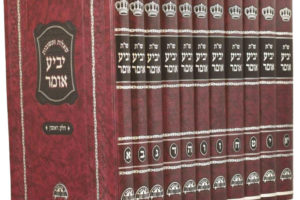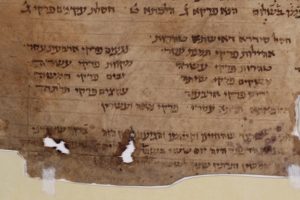Professor Ithamar Gruenwald
This small book by Professor Ithamar Gruenwald, From the Wailing Wall to the Mourning God: Thoughts for the Ninth of Av, published by Shikey Press and available to be ordered here, takes readers on a profound exploration of the unique significance of Tisha B’Av, a day that holds immense importance in Jewish tradition as a day of mourning, commemorating the destruction of the First and Second Temples. Professor Gruenwald, a distinguished and celebrated scholar in the field of Jewish and religious studies, brings his renowned interdisciplinary approach and groundbreaking research to skillfully delve into the historical, theological, and cultural dimensions of Tisha B’Av. As Professor Emeritus at Tel-Aviv University, his expertise and scholarly prowess enable a comprehensive exploration of this significant day. With insightful analysis, he illuminates the enduring relevance of this solemn day in Jewish history and thought.
These insightful essays, originally written by Professor Gruenwald for Haaretz, have been expanded by the author and now see their English translation debut, thanks to the combined efforts of Shikey Press and The Institute for Jewish Research and Publications. The Institute has overseen the meticulous translation and editing process, ensuring the work’s accessibility to a broader audience. Shikey Press, a young boutique publishing house, has played an instrumental role in actualizing this publication, thereby marking an important milestone in bringing these essays to international readers. With a mission to democratize knowledge and make groundbreaking research accessible to all, regardless of their location, Shikey Press consistently pushes the boundaries of traditional publishing. Already, they have produced over fifty books across various facets of Jewish history, law, and culture. The publication of Professor Gruenwald’s work not only testifies to their commitment to this mission but also reinforces the trust placed in them by respected authors worldwide.
In his tribute in the 2014 festschrift honoring Professor Gruenwald, Professor Gideon Bohak emphasizes the pioneering nature of his work, which is characterized by a constant drive to advance the field and pave the way for fellow researchers. As Bohak eloquently states, Professor Ithamar Gruenwald “strives to take one step ahead of the field and pave the way for his fellow researchers.” Through his groundbreaking research on the relationship between Jewish apocalyptic literature and the literature of the temples and the Merkavah, Gruenwald challenges established conventions and provides new insights, that “grew out of a rich substratum of early Jewish traditions and ideas” found expression mostly in the “external” literature of the time. Furthermore, Professor Gruenwald’s argument that the parallels between ancient Jewish and Gnostic literatures stem from the influence of Judaism on the Gnostics, rather than vice versa, is now widely accepted, reflecting the pioneering nature of his research.
Bohak emphasizes that these claims made by Gruenwald are highly significant and have challenged fundamental assumptions in the field of Jewish studies. Professor Gruenwald’s contributions extend to the study of Jewish mystical literature, particularly medieval Jewish Kabbalah, where he seeks to identify historical continuity and understand the similarities and differences across different periods. Additionally, Gruenwald’s engagement with methodological questions in Jewish studies, such as the attitude of Rabbinic literature toward mystical and magical phenomena, showcases his analytical rigor and dedication to advancing the field. Bohak’s tribute emphasizes the profound impact of Gruenwald’s research, highlighting how his scholarly methodologies have consistently exhibited an interdisciplinary approach and an unwavering commitment to pushing the boundaries of research in Jewish and religious studies. Throughout an extensive career spanning over half a century, his innovative approaches and interdisciplinary mindset have become defining features, resonating with the significance of his contributions to the field. For a more comprehensive exploration of his work, see Gideon Bohak, “Professor Ithamar Gruenwald: From Apocalypticism to Mysticism, and from Jewish Studies to Religious Studies,” in Gideon Bohak, Ron Margolin, and Ishay Rosen-Zvi, eds., Myth, Ritual and Mysticism: A Festschrift for Ithamar Gruenwald [=Te’uda, vol. 26] (Tel-Aviv: Tel-Aviv University, 2014): 15-28 (Hebrew), available to be read here.
As noted above, it is worth highlighting that in their earlier versions, these essays were originally published as newspaper columns in the supplements of Haaretz. Through these contributions, Professor Gruenwald takes readers back to an era of academic Jewish scholarship deeply rooted in the historical traditions of Wissenschaft des Judentums (or Hokhmat Yisrael). This respected academic community included notable figures such as Avigdor (Victor) Aptowitzer, Shraga Abramson, Ephraim E. Urbach, Jacob Katz, A.M. Habermann, Naftali Ben-Menahem, Shlomo Dov Goitein, Gershom Scholem, among others. While many scholars of that time limited the spreading of their groundbreaking research to academic journals, books, and festschriften within their scholarly circles, these intellectuals went beyond those confines. They actively sought to transcend academic exclusivity and engage with a broader audience, aiming to share their knowledge and findings beyond the scholarly community.
Through their individual contributions to Haaretz and other newspapers representing a wide range of ideological perspectives in Israeli society, this group of scholars – although they did not consciously perceive themselves as a unified collective – redefined the concept of being a member of the ‘Republic of Jewish Letters’ and brought about a transformative change in the dissemination of knowledge. Together, their combined efforts reshaped the way knowledge was shared. During the early years of the State of Israel, these scholars revolutionized the dissemination of knowledge through their engagement in public discourse. They expanded the reach of knowledge beyond academia, fostering a vibrant exchange of ideas among diverse audiences. Their aim went beyond education; they actively engaged diverse readerships, inspiring intellectual curiosity and democratizing knowledge. By presenting their expertise in accessible formats, they captivated a broader audience and brought about a revolution in knowledge dissemination.
Their contributions not only enlightened, informed, and inspired, but also bridged deep divides within Israeli society. In a country marked by ideological disagreements, their writings served as a common ground where diverse perspectives converged, fostering meaningful and stimulating dialogue. Amid highly polarized debates on religious, political, and social issues, these scholars acted as educators, mentors, and catalysts for intellectual growth. Their newspaper columns encouraged readers to critically examine their beliefs and engage with alternative viewpoints, promoting shared knowledge. By actively participating in the public sphere, they reshaped public discourse, embodying intellectual openness and the pursuit of truth. Their writings acted as catalysts for introspection, empathy, and understanding, nurturing a shared intellectual curiosity. They aimed to cultivate a cohesive and inclusive Israeli society, transcending ideological divisions and fostering unity. Through their exploration of culturally significant topics and Jewishly resonant historical contexts, these scholars unearthed narratives that resonated with readers from diverse backgrounds, fostering a deeper understanding and appreciation for Jewish literature, culture, and tradition. Their words became a source of intellectual nourishment, strengthening the connection to Jewish heritage and nurturing a shared sense of identity. Scholars in the field of academic Jewish Studies gained prominence, captivating audiences and receiving recognition for their intellectual contributions.
In his own contributions to the Haaretz cultural supplements, Professor Ithamar Gruenwald follows in the footsteps of these esteemed scholars, evoking this rich legacy. By transporting readers back in time and immersing them in the intellectual currents of the past, he offers a glimpse into a vibrant era of Jewish scholarship and reminds us of its continued possibilities. His insightful writings keep the flame of this intellectual tradition alive, ensuring the spirit of inquiry, learning, and enlightenment continues to inspire and shape our collective understanding of Jewish culture and literature.
Shikey Press, a young yet impactful boutique publishing house, is proud to present this volume, From the Wailing Wall to the Mourning God: Thoughts for the Ninth of Av by Professor Ithamar Gruenwald. We appreciate the trust bestowed on us by Professor Gruenwald and all our distinguished authors, acknowledging the significance of their contributions to our growing repertoire. Even in our brief tenure, we have produced over fifty books encompassing diverse aspects of Jewish history, law, and culture, reflecting our commitment to rendering high-quality research accessible to scholars and the general public alike. Challenging the conventional publishing paradigm, Shikey Press employs a disruptive, forward-thinking approach. We are guided by the conviction that studying Jewish intellectual and religious history is integral to understanding our collective past and present. By daring to deviate from the norm, we strive to democratize knowledge, making it accessible and engaging to a diverse readership. Our mission centers on bridging the gap between academia and the wider public, inviting all to partake in the rich tapestry of Jewish intellectual discourse. We extend an invitation to scholars and readers to join us in this transformative journey, as we continue to unveil the depth and relevance of Jewish intellectual and religious history. Co-founded by Mr. Menachem Butler and Rabbi David Shabtai, MD, Shikey Press remains steadfast in its commitment to broadening horizons, enhancing our collective understanding of the world through the lens of Jewish scholarship.
In From the Wailing Wall to the Mourning God: Thoughts for the Ninth of Av, Professor Ithamar Gruenwald’s interdisciplinary expertise and profound reflections guide readers through an exploration of Tisha B’Av, encouraging a deeper engagement with its significance. With deep insights into the historical, theological, and cultural dimensions, he invites readers to grapple with enduring themes of suffering, redemption, and the search for solace. Through his unique blend of rigorous scholarship and heartfelt contemplation, Professor Gruenwald illuminates the profound impact of the destruction of the Temples on Jewish collective consciousness, offering valuable insights into the complexities of Jewish history, thought, and memory. This book serves as a testament to his remarkable contributions to the field and an invaluable resource for scholars and readers interested in understanding the rich tapestry of Jewish tradition and its enduring relevance in the modern world.
May this book guide your reflection on Tisha B’Av, deepening your understanding through Professor Ithamar Gruenwald’s insightful analysis of this significant day in Jewish commemoration.




